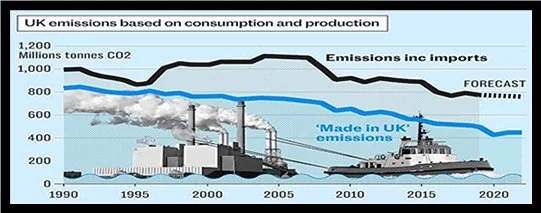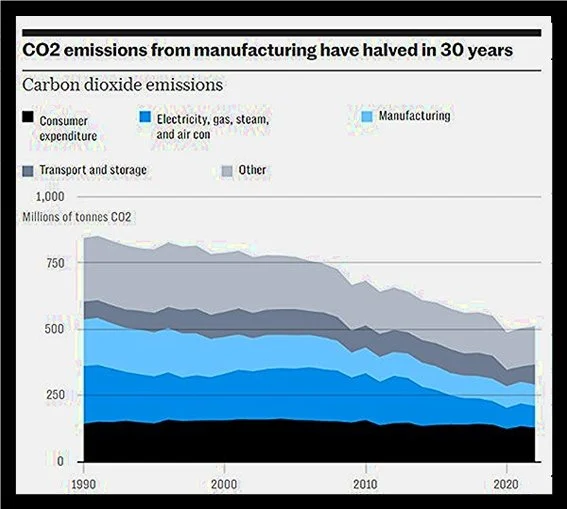The ‘elephant in the room’ that risks exposing Britain’s net zero agenda… (The Telegraph)
Notes from the editor:
To be or not to be is the big question that suddenly confronts the net-zero emission movement...
The challenge of reducing CO2 emissions is a significant issue for central banks and governments amid the current global inflation. For some banks, there is an increasing acknowledgement of their role in funding the transition from carbon-emitting activities. Meanwhile, governments are tasked with creating policies to encourage CO2 reductions while considering the economic impacts of an already very complex economy. Both face the difficult task of transitioning to a low-carbon economy, which involves managing the shift from fossil fuels to sustainable energy sources.
Banks are under pressure from stakeholders and regulators to reduce financed emissions. However, a powerful movement is also working behind the scenes, indicating the risks involved if all efforts are directed towards renewable energy. At the same time, they advocate for a red-carpet return to nuclear power, with many aiming for net-zero emissions by 2050. However, the dilemma for banks and governments is balancing economic growth, environmental responsibility, and societal expectations. For instance, Citigroup, a major financier of fossil fuel businesses, may need to raise $73 billion under a climate stress scenario. Central banks are also developing stress tests to assess climate change risks for the banks they oversee.
Finally, this analysis elucidates the factors contributing to the anticipated delayed pace of transformation within major financial institutions. These old conservative institutions perceive a formidable obstacle in the intricate nature of their financial operations, likened to a substantial and seemingly insatiable elephant in the room.
In December 2023, Energy Central celebrated top contributors in the Energy & Sustainability Network at the 'Top Voices' event. Winners were featured in 6 articles, demonstrating community recognition. The platform enables professionals to share their work, interact with colleagues, and collaborate with influencers. Congratulations to the 2023 Top Voices: David Hunt, Germán Toro Ghio, Schalk Cloete, and Dan Yurman for demonstrating their expertise. - Matt Chester, Energy CentralDon't miss out on the chance to show us some love by tossing a coin our way and signing up for our newsletter. Your support is like a ray of sunshine on a cloudy day, fueling our passion to keep churning out awesome content just for you. We're beyond grateful to have you as part of our tribe!
Thank you for your kind contributions…
Have a wonderful day filled with good health, happiness, and love…
"Imagine a crystal-clear river flowing through the creation of a vast and boundless sustainable park that stretches to every corner of the world. This analogy perfectly captures AES's remarkable efforts in the global energy industry...Source: The TelegraphUK’s ‘hidden’ carbon emissions fail to show the bigger picture
Jonathan Leake11 March 2024It’s one of the Government’s proudest boasts. Britain, it claims, has almost halved its greenhouse gas emissions from 800m tonnes in 1990 to just 417m tonnes in 2022.
It’s a staggering decrease – a faster decline than almost any other advanced nation. And it is a fact that is used regularly by politicians to trumpet the UK’s progress.
“We’re far ahead of every other country in the world,” Rishi Sunak said in September. “We’ve had the fastest reduction in greenhouse gas emissions in the G7. Down almost 50pc since 1990. France? 22pc. The US? No change at all. China? Up by over 300pc.”
But can a nation whose population has grown by several million in the past two decades, with each citizen consuming more than ever, really have cut emissions by such a massive amount?
Part of the answer to that question lies in the databases of Leeds University where the UK’s official “consumption emissions” figures – the statistical elephant in the room – are compiled by a team led by Professor John Barrett.
When politicians say that emissions have fallen to 400m tonnes, they are referring to the greenhouse gases emitted within Britain’s borders, from power stations, cars, homes, offices and what’s left of industry. These are known as territorial – or production – emissions.
What they exclude is everything else, meaning all foreign-produced cars, clothes, food and every other import as well as the shipping that imports those goods into the UK, and most of the aviation fuel burned for passenger flights.
These overseas emissions used to be relatively small, but as the UK’s own industries have shrunk, they have become an ever-increasing proportion of the overall carbon footprint.
Source: ONS
In 1990, overseas emissions totalled less than 200m tonnes of CO2 emissions per year. Since then the UK’s increasing reliance on imports means overseas emissions totalled 350m to 400m tonnes.
Last year the UK exported goods worth £393bn according to government data. However, Britain imported goods worth £581bn, resulting in an excess of £189bn.
“Within a couple of years, greenhouse gas emissions associated with UK consumption will result in more emissions outside the UK than inside the UK,” says Leeds University’s Barrett. “Emissions embodied in imports will be more than the total territorial emissions in the UK.”
In real terms it means that, in addition to the 400m or so tonnes of CO2 pouring from Britain’s homes, vehicles and remaining smokestacks, there are another 350m to 400m tonnes being produced on the UK’s behalf but in other countries. If you add those two figures together and make an adjustment for the UK’s exports, you get Britain’s overall carbon footprint – its consumption emissions – which now total around 750m to 800m tonnes.
It is a marked fall from 1990 when the UK’s consumption emissions totalled 1bn tonnes but nowhere near the 50pc cut claimed by Mr Sunak last year.
“We have provided the Government with the UK’s consumption-based emissions data for many years,” says Barrett. “However, it is rarely or never quoted when statements are made about emission reduction. I believe it should be. Both approaches are needed.”
Energy consumption figures give an answer as to why the UK’s own CO2 emissions have sunk so rapidly. In 2022, the country used less energy from all sources including coal, gas and renewables than in any year since 1970.
The Government’s energy statistics briefings link this to warm weather and improved efficiency.
Perhaps one of the most obvious contributors is the closure of the fleet of coal-fired power stations that provided around 40pc of UK electricity as recently as the 1990s but which emitted tens of millions of tonnes of CO2 a year. However, although their closure caused some of the decline in emissions, it cannot explain the fall in overall energy consumption.
For economists there has always been a direct link between economic growth and rising energy consumption; the more energy a country can consume, the richer its population becomes.
Jorge León, senior vice-president for oil and energy research at Rystad Energy, says: “I’ve heard loads of politicians saying, ‘look, this decline in energy consumption is great, we’ve become more efficient’. But I don’t think it is all due to greater efficiency.
“We have seen many energy intensive industries closing down in Europe because of the high energy costs. This is a broad macroeconomic environment where things are not looking great, where output is decreasing. Our declining emissions reflect that.”
The Government’s own statistics show that the sector experiencing the biggest decline in energy use is UK industry. In 1970 when the UK still had its own steel and other heavy industries, energy equivalent to 65m tonnes of oil was consumed. By 2022 that had plummeted by two-thirds to 22m tonnes.
Source: GOV. UKSome industrialists warn it will sink further still. Last month, Sir Jim Ratcliffe, head of chemicals giant Ineos, wrote to Ursula von der Leyen, president of the European Commission, warning that the UK and Europe were “sleepwalking towards offshoring its industry, jobs, investments, and emissions”.
Sir Jim added that carbon taxes, designed to drive emissions down still further, were also “driving away investment”.
“These taxes have encouraged imports from countries without carbon taxes, which has increased the carbon footprint of Europe,” he said. “We’re not doing the world any favours if we’re substituting relatively high-quality production here in terms of emissions with poorer quality, lower regulated production from other parts of the world.”
Asked why ministers always cite the UK’s territorial emissions but never mention overall consumption, a government spokesman said: “The data is calculated using the agreed international approach to report emissions produced within each territory to avoid them being double counted.”
However the Government’s own advisers, the Climate Change Committee, said in its latest progress report to ministers, that the UK “must also reduce its consumption emissions, those embedded in imported goods and services”.
It added: “The Committee will continue to scrutinise progress on consumption emissions alongside territorial emissions and advise on policies that reduce both. Reducing emissions in the UK must not be at the expense of exporting jobs and emissions overseas.”
Bob Ward, policy director at the London School of Economics’ Grantham Research Institute for Climate Change, says: “Most of the decline in territorial emissions since 1990 has been due to the phase-out of coal in the power sector. In addition there have been declines in overall energy use, partly due to our economy becoming more services-based with manufacturing moving to countries with lower labour costs.”
Scientists and business leaders fear that if politicians are allowed to keep citing only the UK’s national emissions figures, while ignoring those generated by imports, consumers will become complacent about the environment.
Myles Allen, Oxford University’s professor of geosystem science, who served on the UN Intergovernmental Panel on Climate Change (IPCC), says the real discussions about emissions should be around ending them completely.
“Achieving net zero should mean, from 2050, no one will be allowed to sell stuff that causes global warming,” he says. “So anyone who sells a product that causes global warming would need to explain how they are going to stop it causing global warming – whether through its production, use or disposal – by 2050.
“If a single politician could spell it out in these not-very-complicated terms, it would have far more impact than claims about the UK’s carbon footprint.”








